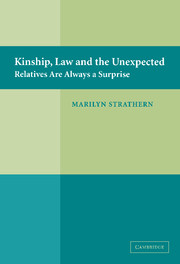3 - Emergent Properties
Published online by Cambridge University Press: 08 January 2010
Summary
Geneaology or issue which they had, Artes which they studied, Actes which they did. This part of History is named Anthropology.
Richard Harvey 1593, Philadelphus. Oxford English Dictionary's first entry for ‘anthropology’Indeed it would be lost labour to seek for the parentage of all words, when many probably had none. But there is no such thing; there is no word which is not … [the] son of something …
Richard Trench 1882, On the study of wordsAnthropologists often find themselves gravitating toward debate, public dispute, litigation even, as telling moments in cultural life. For what may be as interesting as the positions being defended are the cultural resources people bring to their aid, the narratives, tropes and images enlisted in the service of the persuasive point. An unusual state of affairs is rendered familiar or one situation is made vivid through analogy with another; conviction might lie in appeal to the old, or quite new combinations of ideas may be conjured up. Of course, what is said in the heat of argument is likely to be a poor index to what people contemplate in less freighted moments. Yet an unreliable guide in this regard can turn out to be a fascinating guide in another respect. If only in order to persuade, the narratives, images, tropes and analogies must at the least communicate what is possible, and anthropological interest in such resources is an interest in the possibilities entailed by what is said or done for what others say or do.
- Type
- Chapter
- Information
- Kinship, Law and the UnexpectedRelatives are Always a Surprise, pp. 50 - 78Publisher: Cambridge University PressPrint publication year: 2005

